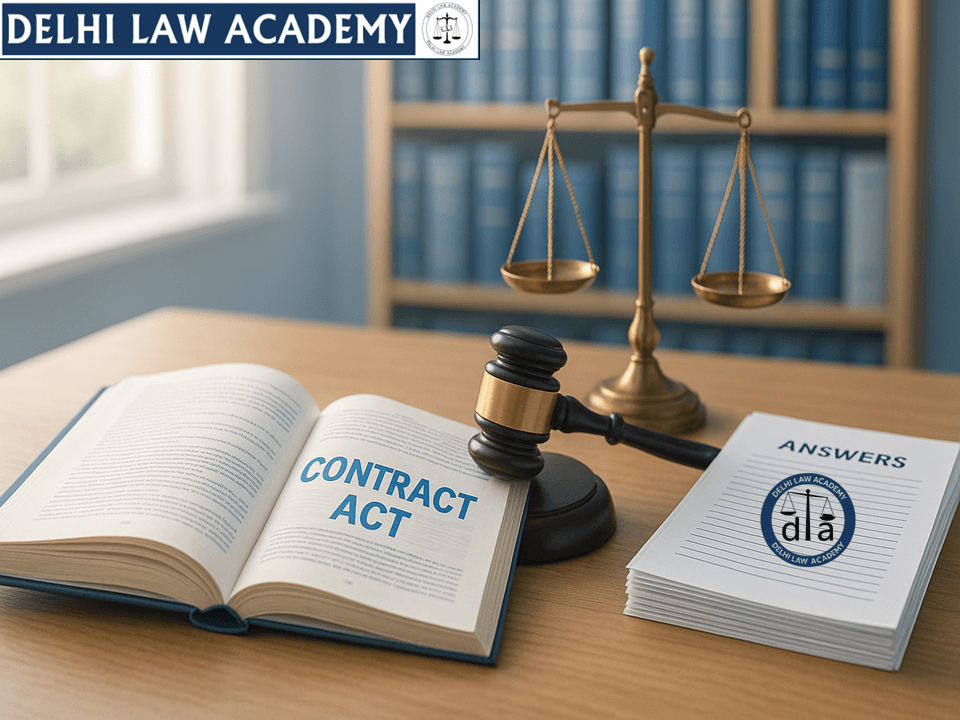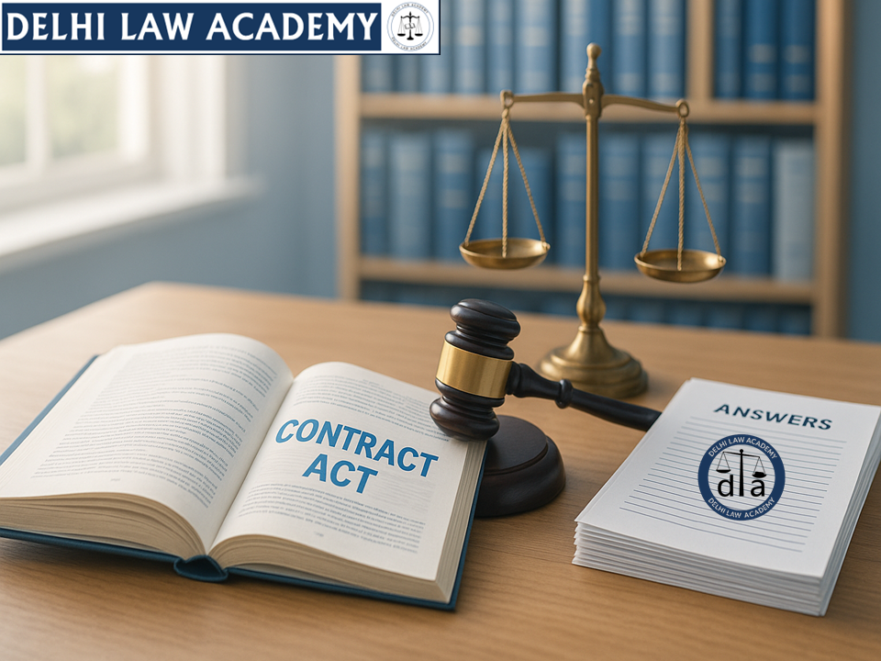
⚖️ Section 1 – Territorial extent
This Act applies to the whole of India except the State of Jammu and Kashmir
Words “except the State of Jammu and Kashmir” have now been omitted by the Jammu and Kashmir Reorganisation Act, 2019
The Indian Contract Act 1872 therefore now applies to the whole of India including Jammu and Kashmir and Laddakh.
Q What is a contract?
Ans A contract is an agreement enforceable by law.
Q What is an agreement?
Ans: An agreement has three characteristics:
- A proposal
- Acceptance of the proposal
- A consideration
📖 Interpretation – Section 2
Section 2 (a)
When one person
- signifies his willingness to do a thing
- for obtaining assent of another to such act
he is said to make a proposal
When one person
- signifies his willingness to abstain from doing anything
- for obtaining assent of that other to such abstinence
he is said to make a proposal
Section 2 (b)
When a person to whom proposal is made signifies his assent thereto
the proposal is said to be accepted
A proposal, when accepted becomes a promise
Section 2 (c)
Person making the proposal
- is “promisor”
Person accepting the proposal
- is “promisee”
Section 2 (d)
When
- promisee or any other person has done or does or promises to do something
- at the desire of the promisor
- such act or promise is called a consideration for the promise
Section 2 (e)
Every promise is an agreement
Every set of promises forming consideration for each other is an agreement
All agreements Enforceable by law: are contracts: Section 2(h)
All agreements Enforceable by law at the option of one party but not at the option of the other: are voidable contracts: Section 2(i)
All agreements Not enforceable by law: are void: Section 2(g)
Section 2 (j)
A contract which ceases to be enforceable by law
- becomes void when it ceases to be enforceable
Q When is the contract completed in a self-service shop?
Who makes the offer, who accepts?
Case study 1 – Pharmaceutical Society of Great Britain v. Boots Cash Chemists 1952
The mere fact that a shop keeper exposes goods which indicate to the public that he is willing to treat does not amount to an offer to sell.
In a self-service shop, the customer is informed that he can pick up an article and bring it to the shop-keeper, the contract for sale being completed if the shop-keeper accepted the customer’s offer to buy. The offer is an offer to buy, not an offer to sell.
If in a self-service shop the contract was complete directly when the purchaser picked up the article the property would pass to him at once and he would be able to insist on the shop keeper allowing him to take it away, even where the shop-keeper might think it very undesirable.
On the other hand, once a person had picked up an article, he would never be able to put it back and say that he had changed his mind. The shop-keeper could say that the property had passed and he must buy.
The shop-keeper is not making an offer to avail every article in the shop to any person who may come in. Such a person cannot insist on buying by saying: “I accept your offer.”
Q What happens in a bookshop?
In a bookshop, books are displayed and customers are invited to pick them up and look at them even if they do not actually buy them.
There is no offer of the shop-keeper to sell before the customer has taken the book to the shop-keeper or his assistant and said that he wants to buy it and the shopkeeper has said: “Yes.”
Q In a self-service shop:
Shopkeeper does not make an offer to sell rather; he invites the public to make offers to buy. It is the customer who makes an offer to buy. Shopkeeper may or may not accept that offer. Contract is made when the shopkeeper accepts the offer.
Case study 2 – Harvey v. Facey 1893 PC
Telegram from Harvey:
- Will you sell us Bumper Hall Pen? Telegraph lowest cash price.
Reply telegram by Facey:
- ‘Lowest price for Bumper Hall Pen £900’
Next telegram from Harvey:
- We agree to buy Bumper Hall Pen for the sum of nine hundred pounds asked by you.
Analysis of the telegrams:
The first telegram asks two questions. The first question is as to the willingness of Facey to sell to the appellants [Harvey]; the second question asks the lowest price …
Facey replies to the second question only, and gives his lowest price.
Privy Council decision
Their Lordships cannot treat the telegram from Facey [the second telegram] as binding him in any respect, except to the extent it does by its terms, viz, the lowest price.
Everything else is left open, and the reply telegram from the appellants [Harvey] cannot be treated as an acceptance of an offer to sell to them; it is an offer that required to be accepted by Facey.
The contract could only be completed if Facey had accepted the appellant’s last telegram. Their Lordships are of opinion that the mere statement of the lowest price at which the vendor would sell contains no implied contract to sell at that price to the persons making the inquiry.
Significance
This case defines the difference between an offer and supply of information.
The Privy Council held that the indication of lowest acceptable price does not constitute an offer to sell. Rather, it is considered an offer to treat (i.e., to enter into negotiations).
📚 Continue Your Contract Act Preparation
Don’t stop here! Strengthen your knowledge of the Contract Act with our other fully solved tests:
📘 Free Study Material for Judiciary Aspirants!
Download our FREE study material prepared by Delhi Law Academy’s expert faculty.
❓ Frequently Asked Questions
Contact us
📍 Delhi Law Academy – Jaipur Branch
6C, Tower 2, Coaching Hub, Pratap Nagar, Jaipur – 302033
📞 Phone:
+91 9911916552
+91 8447285606
✉️ Email:
contactus@delhilawacademy.com

